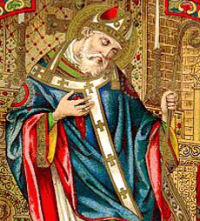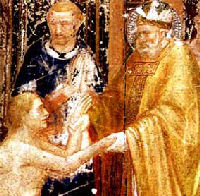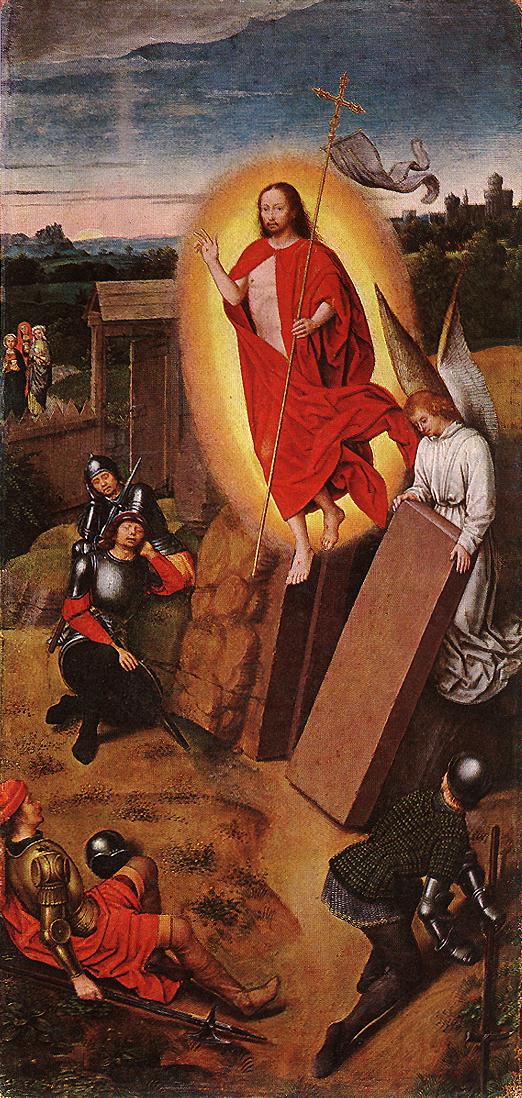31. He that comes from above is above all: he that is of the earth is earthly, and speaks of the earth: he that comes from heaven is above all.
32. And what he has seen and heard, that he testifies;
CHRYS. As the worm gnaws wood, and rusts iron, so vainglory destroys the soul that cherishes it. But it is a most obstinate fault. John with all his arguments can hardly subdue it in his disciples: for after what he has said above, he said yet again, He that comes from above is above all: meaning, You extol my testimony, and say that the witness is more worthy to be believed, than He to whom he bears witness. Know this, that He who comes from heaven, cannot be accredited by an earthly witness. He is above all; being perfect in Himself, and above comparison.
THEOPHYL. Christ comes from above, as descending from the Father; and is above all, as being elected in preference to all.
ALCUIN. Or, comes from above; i.e. from the height of that human nature which was before the sin of the first man. For it was that human nature which the Word of God assumed: He did not take upon Him man's sin, as He did his punishment.
He that is of the earth is of the earth; i.e. is earthly, and speaks of the earth, speaks earthly things. CHRYS. And yet he was not altogether of the earth; for he had a soul, and partook of a spirit, which was not of the earth. What means he then by saying that he is of the earth? Only to express his own worthlessness, that he is one born on the earth, creeping on the ground, and not to be compared with Christ, Who comes from above. Speaks of the earth, does not mean that he spoke from his own understanding; but that, in comparison with Christ's doctrine, he spoke of the earth: as if he said, My doctrine is mean and humble, compared with Christ's; as becomes an earthly teacher, compared with Him, in Whom are hid all the treasures of wisdom and knowledge.
AUG. Or, speaks of all the earth, he said of the man, i.e. of himself, so far as he speaks merely humanly. If he says ought divine, he is enlightened by God to say it: as said the Apostle; Yet not I, but the grace of God which was with me. John then, so far as pertains to John, is of the earth, and speaks of the earth: if you hear ought divine from him, attribute it to the Enlightener, not to him who has received the light.
CHRYS. Having corrected the bad feeling of his disciples, he comes to discourse more deeply upon Christ. Before this it would have been useless to reveal the truths which could not yet gain a place in their minds. It follows therefore, He that comes from heaven.
GLOSS. That is, from the Father. He is above all in two ways; first, in respect of His humanity, which was that of man before he sinned: secondly, in respect of the loftiness of the Father, to whom He is equal.
CHRYS. But after this, high and solemn mention of Christ, his tone lowers: And what he has seen and heard, that he testifies. As our senses are our surest channels of knowledge, and teachers are most depended on who have apprehended by sight or hearing what they teach, John adds this argument in favor of Christ, that, what he has seen and heard, that he testifies: meaning that every thing which He said is true. I want, said John, to hear what things He, Who comes from above, has seen and heard, i.e. what He, and He alone, knows with certainty.
THEOPHYL. When you hear then, that Christ speaks what He saw and heard from the Father, do not suppose that He needs to be taught by the Father; but only that that knowledge, which He has naturally, is from the Father. For this reason He is said to have heard, whatever He knows, from the Father.
AUG. But what is it, w which the Son has heard from the Father? Has He heard the word of the Father? Yes, but He is the Word of the Father. When you conceives a word, wherewith to name a thing, the very, conception of that thing in the mind is a word. Just then as you have in your mind and with you your spoken word; even so God uttered the Word, i.e. begat the Son. Since then the Son is the Word of God, and the Son has spoken the Word of God to us, He has spoken to us the Father's word. What John said is therefore true.
32. - and no man receives his testimony.
33. He that has received his testimony has set to his seal that God is true.
34. For he whom God has sent speaks the words of God: for God gives not the Spirit by measure to him.
35. The Father loves the Son, and has given all things into his hand.
36. He that believes on the Son has everlasting life: and he that believes not the Son shall not see life; but the wrath of God abides on him.
CHRYS. Having said, And what he has seen and beard, that he testifies, to prevent any from supposing, that what he said was false, because only a few for the present believed, he adds, And no man receives his testimony; i.e. Only a few; for he had disciples who received his testimony. John is alluding to the unbelief of his own disciples, and to the insensibility of the Jews, of whom we read in the beginning of the Gospel, He came to His own, and His own received Him not.
AUG. Or thus; There is a people reserved for the wrath of God, and to be condemned with the devil; of whom none receives the testimony of Christ. And others there are ordained to eternal life. Mark how mankind are divided spiritually, though as human beings they are mixed up together: and John separated them by the thoughts of their heart, though as yet they were not divided in respect of place, and looked on them as two classes, the unbelievers, and the believers. Looking to the unbelievers, he said, No man receives his testimony. Then turning to those on the right hand he said, He that has received his testimony, has set to his seal.
CHRYS. i.e. has shown that God is true. This is to alarm them: for it is as much as saying, no one can disbelieve Christ without convicting God, Who sent Him, of falsehood: inasmuch as He speaks nothing but what is of the Father. For He, it follows, Whom God has sent, speaks the words of God.
ALCUIN. Or, Has put to his seal, i.e. has put a seal on his heart, for a singular and special token, that this is the true God, Who suffered for the salvation of mankind.
AUG. What is it, that God is true, except that God is true, and every man a liar? For no man can say what truth is, till he is enlightened by Him who cannot lie. God then is true, and Christ is God. Would you have proof? Hear His testimony, and you will find it so. But if you do not yet understand God, you have not yet received His testimony. Christ then Himself is God the true, and God has sent Him; God has sent God, join both together; they are One God. For John said, Whom God has sent, to distinguish Christ from himself. What then, was not John himself sent by God? Yes; but mark what follows, For God gives not the Spirit by measure to Him. To men He gives by measure, to His only Son He gives not by measure. To one man is given by the Spirit the word of wisdom, to another the word of knowledge: one has one thing, another another; for measure implies a kind of division of gifts. But Christ did not receive by measure, though He gave by measure.
CHRYS. By Spirit here is meant the operation of the Holy Spirit. He wishes to show that all of us have received the operation of the Spirit by measure, but that Christ contains within Himself the whole operation of the Spirit. How then shall He be suspected, Who said nothing, but what is from God, and the Spirit? For He makes no mention yet of God the Word, but rests His doctrine on the authority of the Father and the Spirit. For men knew that there was God, and knew that there was the Spirit, (although they had not right belief about His nature;) but that there was the Son they did not know.
AUG. Having said of the Son, God gives not the Spirit by measure to Him; he adds, The Father loves the Son, and farther adds, and has given all things into His hand; in order to show that the Father loves the Son, in a peculiar sense. For the Father loves John, and Paul, and yet has not given all things into their hands. But the Father loves the Son, as the Son, not as a master his servant: as an only, not as an adopted, Son. Wherefore He has given all things into His hand; so that, as great as the Father is, so great is the Son; let us not think then that, because He has deigned to send the Son, any one inferior to the Father has been sent.
THEOPHYL. The Father then has given all things to the Son in respect of His divinity; of right, not of grace. Or; He has given all things into His hand, in respect of His humanity: inasmuch as He is made Lord of all things that are in heaven, and that are in earth.
ALCUIN. And because all things are in His hand, the life everlasting is too: and therefore it follows, He that believes on the Son has everlasting life.
BEDE. We must understand here not a faith in words only, but a faith which is developed in works.
CHRYS. He means not here, that to believe on the Son is sufficient to gain everlasting life, for elsewhere He says, Nor every one that said to Me, Lord, Lord, shall enter into the kingdom of heaven. And the blasphemy against the Holy Ghost is of itself sufficient to send into hell. But we must not think that even a right belief in Father, Son, and Holy Ghost, is sufficient for salvation; for we have need of a good life and conversation. Knowing then that the greater part are not moved so much by the promise of good, as by the threat of punishment, he concludes, But He that believes not the Son, shall not see life; but the wrath of God abides on him. See how He refers to the Father again, when He speaks of punishment. He said not, the wrath of the Son, though the Son is judge; but makes the Father the judge, in order to alarm men more. And He does not say, in Him, but on Him, meaning that it Will never depart from Him; and for the same reason He says, shall not see life, i.e. to show that He did not mean only a temporary death!
AUG. Nor does He say, The wrath of God comes to him, but, abides on him. For all who are born, are under the wrath of God, which the first Adam incurred. The Son of God came without sin, and was clothed with mortality: He died that you might live. Whosoever then will not believe on the Son, on him abides the wrath of God, of which the Apostle speaks, We were by nature the children of wrath.
Catena Aurea John 3



 The king at the time, Boleslaus II, trying to strengthen his own power, led an expedition against the grand duchy of Kiev, making himself very unpopular with the nobles of the country, who opposed his policies. St. Stanislaus of Cracow sided with the nobles, led by the king's brother, Ladislaus, and this brought him into conflict with the king.
The king at the time, Boleslaus II, trying to strengthen his own power, led an expedition against the grand duchy of Kiev, making himself very unpopular with the nobles of the country, who opposed his policies. St. Stanislaus of Cracow sided with the nobles, led by the king's brother, Ladislaus, and this brought him into conflict with the king. 
